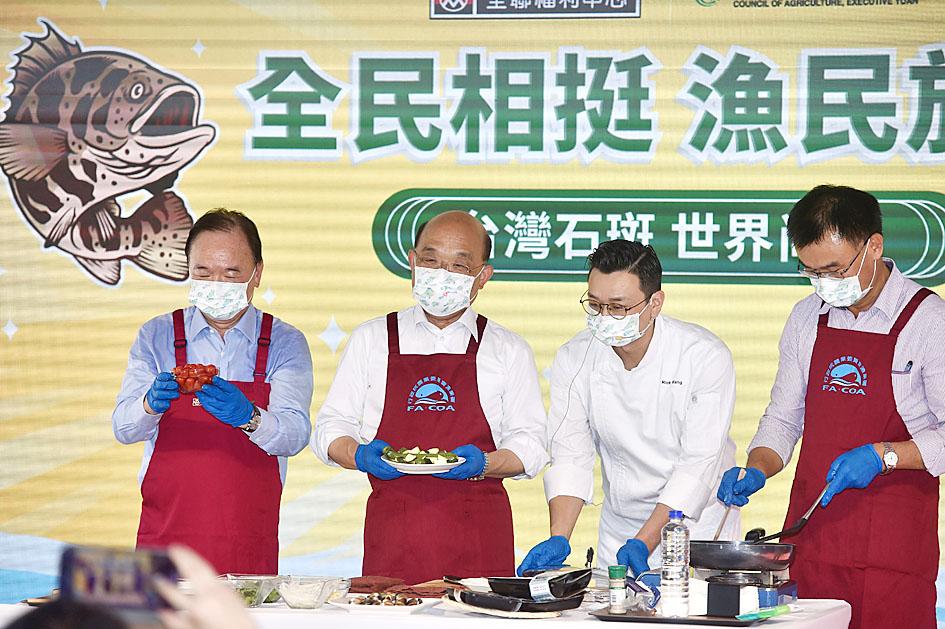The Council of Agriculture (COA) is to establish a system to improve the management of grouper fish exports to prevent fish farmers from using licenses that are not theirs to facilitate exports to China, COA Minister Chen Chi-chung (陳吉仲) said on Wednesday.
Beijing on Monday last week implemented a ban on grouper imports from Taiwan, saying that it had detected prohibited chemicals in some shipments.
Since the cross-strait Economic Cooperation Framework Agreement came into effect in 2010, China has required Taiwan-based grouper farmers to provide documents every year to be allowed to export their fish to China, Chen said.

Photo: George Tsorng, Taipei Times
The requirement is not in line with agricultural trade practices internationally, he said.
However, some grouper farmers have used export permits that were issued by Beijing to other farmers in Taiwan to access the China market, he said.
The COA would set up a mechanism to improve its administration of grouper farming, maintain fish quality and ensure safe use of chemicals, he said.
There are more than 1,000 grouper farms in Taiwan and their annual output is estimated to be nearly 20,000 tonnes, he said.
Taiwan has banned 830 agricultural products from China to protect the interests of Taiwanese farmers, he said.
However, if China wants to discuss cross-strait trade, Taiwan would welcome the consultation, he said.
Hopefully, Beijing would respond to the COA’s reports on its testing standards for chemicals in grouper, Chen said.
Taiwan has provided a report on grouper testing via the cross-strait animal and plant health inspection and quarantine platform, he said, adding that discussions on the issue would be welcome.
The COA had previously said it had tested the fish, but found no evidence of banned chemicals.
As of last month, Taiwan had exported 3,059 tonnes of grouper to China, including Hong Kong, and Beijing’s ban is expected to reduce overall exports of the fish by 3,600 tonnes this year, COA data showed.

A group of Taiwanese-American and Tibetan-American students at Harvard University on Saturday disrupted Chinese Ambassador to the US Xie Feng’s (謝鋒) speech at the school, accusing him of being responsible for numerous human rights violations. Four students — two Taiwanese Americans and two from Tibet — held up banners inside a conference hall where Xie was delivering a speech at the opening ceremony of the Harvard Kennedy School China Conference 2024. In a video clip provided by the Coalition of Students Resisting the CCP (Chinese Communist Party), Taiwanese-American Cosette Wu (吳亭樺) and Tibetan-American Tsering Yangchen are seen holding banners that together read:

UNAWARE: Many people sit for long hours every day and eat unhealthy foods, putting them at greater risk of developing one of the ‘three highs,’ an expert said More than 30 percent of adults aged 40 or older who underwent a government-funded health exam were unaware they had at least one of the “three highs” — high blood pressure, high blood lipids or high blood sugar, the Health Promotion Administration (HPA) said yesterday. Among adults aged 40 or older who said they did not have any of the “three highs” before taking the health exam, more than 30 percent were found to have at least one of them, Adult Preventive Health Examination Service data from 2022 showed. People with long-term medical conditions such as hypertension or diabetes usually do not

POLICE INVESTIGATING: A man said he quit his job as a nurse at Taipei Tzu Chi Hospital as he had been ‘disgusted’ by the behavior of his colleagues A man yesterday morning wrote online that he had witnessed nurses taking photographs and touching anesthetized patients inappropriately in Taipei Tzu Chi Hospital’s operating theaters. The man surnamed Huang (黃) wrote on the Professional Technology Temple bulletin board that during his six-month stint as a nurse at the hospital, he had seen nurses taking pictures of patients, including of their private parts, after they were anesthetized. Some nurses had also touched patients inappropriately and children were among those photographed, he said. Huang said this “disgusted” him “so much” that “he felt the need to reveal these unethical acts in the operating theater

Heat advisories were in effect for nine administrative regions yesterday afternoon as warm southwesterly winds pushed temperatures above 38°C in parts of southern Taiwan, the Central Weather Administration (CWA) said. As of 3:30pm yesterday, Tainan’s Yujing District (玉井) had recorded the day’s highest temperature of 39.7°C, though the measurement will not be included in Taiwan’s official heat records since Yujing is an automatic rather than manually operated weather station, the CWA said. Highs recorded in other areas were 38.7°C in Kaohsiung’s Neimen District (內門), 38.2°C in Chiayi City and 38.1°C in Pingtung’s Sandimen Township (三地門), CWA data showed. The spell of scorching